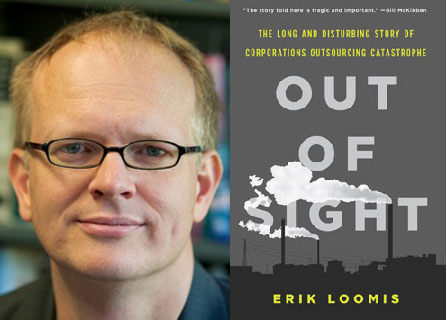Editor’s note: Former Phoenix editor-turned-freelance journalist Phil Eil says WPRO owes him $1,350 for four stories he wrote in late 2014. He agreed to share the below letter he sent to the Cumulus-owned radio station’s corporate office in Atlanta, as well as the local manager in Rhode Island. “I gave WPRO and Cumulus the benefit of the doubt for five months, during which time I conducted all of my attempts to be paid in private,” he said in an email to RI Future. “They have proven themselves unworthy of of the trust and faith I placed in them, and therefore I’m moving my quest to be compensated into the public sphere (where, after all, as a talk radio station and news outlet, they conduct their business).”
In the letter he says, “At this point, this is wage theft, plain and simple.”
April 27, 2015
Accounts Payable
CUMULUS MEDIA INC., CUMULUS BROADCASTING INC.
3280 Peachtree Road, NW Suite 2300
Atlanta, Georgia 30305
CC: Barbara Haynes, General Manager
Cumulus Media Providence
1502 Wampanoag Trail
East Providence, RI 02915
Hello,
My name is Philip Eil and I am a freelance journalist based in Providence, Rhode Island. I’m writing to collect payment for four articles, totaling over 11,500 words, I wrote for 630wpro.com (the website for the Cumulus-owned News Talk 630 & 99.7 FM WPRO, based in East Providence, Rhode Island) in November and December of 2014. The sum of the fees for these articles is $1,350, and my late fees (which I explain at the end of this letter) add up to an additional $684.50. In total, Cumulus Media and/or WPRO owe me $2,034.50, and I am demanding this payment immediately to avoid further legal action.
It’s not customary for me to demand payment from a publicly traded corporation, so some explanation is in order. In October of 2014, the Providence Phoenix (the weekly newspaper where I had worked as news editor) closed. Shortly thereafter, I was approached by WPRO’s Digital Media Director, who was interested in expanding the web content on 630wpro.com. We talked about what he was looking for and the kinds of articles I was interested in writing, and we agreed upon terms that were laid out in a contract that I ultimately signed and submitted on November 17, 2014. On October 31, 2014, 630wpro.com published an article introducing me as a freelance contributor which included a quote from the station’s Program Director: “We are excited to have new, original content from someone as respected as Phil available to us…The original content and perspective he provides will be invaluable to our on-air hosts and online delivery.” That post has since been removed from the website, but I have attached a printed version.

My first article for 630wpro.com, “Campaign 2014: A Look Back,” was published on November 3, 2014, and three more articles followed before year’s end: a 5,000-word interview with the outgoing governor of Rhode Island, Lincoln Chafee; an in-depth report on the state’s use and distribution of the anti-overdose medication, Narcan; and a 3,000-word year-in-review article published in late December. When I still had received no payment after submitting the fourth article, I decided to stop working on new pieces.
So began a still-fruitless quest to be compensated for the contracted work I had done for WPRO – all work that has been published on 630wpro.com alongside ads that presumably generate revenue for the station. Though I had already inquired about the status of my payment in November and December, in January I wrote numerous additional emails and made additional phone calls to various station employees. Despite these repeated inquiries, I received no paycheck.
On January 22, 2015 – more than two months after I had sent my first invoice – I received this email from WPRO’s Business Manager:
Hi Phillip – during the year-end process, payable runs are fewer and farther between as opposed to the normal weekly runs. We don’t cut the checks here, they are processed at the corporate level. I only get reports once per week and will know on Monday if they cut your check this Thursday. If they haven’t, I will get you a cashier’s check and expense it on my monthly expense report. I apologize but it is beyond my control. We haven’t had the ability to cut checks locally since Cumulus took over three years ago.
Still, no check arrived. I made more phone calls and wrote more emails. On February 3 – nearly three months after I first sent an invoice to WPRO – I received this email from the same business manager, following up on a phone call in which she said the check was being overnight-mailed to me:
Hi Phil – I just wanted to let you know that due to the storm yesterday the FEDEX package was not picked up. It is going out today so you should have it tomorrow.
Still, no check arrived. I made more phone calls and wrote more emails. On February 11, I received this note from the Digital Media Director who had initially approached me about working for WPRO:
I was notified that [the Business Manager] is no longer with the company.
There is a corporate business manager in the building and I have reported the missing check to our GM.
Stand by…
Still, no check arrived. I made more calls and wrote more emails. On April 7 – more than four months after I sent my first invoice to WPRO – I received this note from the station’s Program Director.
Hi Phil,
I got your message. I am so sorry this has happened. I know [Digital Media Director] mentioned quite a while ago that you were waiting for money. I thought you had been paid. I will find out what is happening with this and get back to you as soon as I can.
Again, no check arrived. And, as of today, 161 days (5 months, 10 days) after I filed my first invoice, and numerous months after filing invoices for subsequent articles, I still have not been paid for the work I did for 630wpro.com.
While I understand that unforeseen circumstances and personnel issues may have contributed to the delay, I – an independent contractor – should not have to suffer for your company’s internal dysfunction. At this point, this is wage theft, plain and simple. I am not an amateur journalist and my work is not a hobby for me. When I am misled and taken advantage of for nearly six months, I will not remain silent. Last week, after months of private efforts to resolve this situation proved ineffective, I wrote a Facebook post about it, which, in turn, was written about in a local Patch.com article, which, in turn, was picked up by the national media blogger Jim Romenesko, who wrote, “Shame on you, Cumulus Media’s WPRO!” I will continue to tell my story until I am paid.
As you can see, I am CC’ing Barbara Haynes, General Manager of Cumulus Providence, and I will also be simultaneously publishing this letter on the blog rifuture.org. As for the late fees I mentioned, when a client does not pay me within 90 days of receiving my invoice, I assess a fee of one percent of the agreed-upon payment for every additional day that payment is received. In this case, I sent WPRO a $250 invoice for my first article on November 17, 2014. It has been 71 days since the 90-window expired, thus a $177.50 fee has accrued. Add to this the fees from the other three unpaid articles ($260, $160, and $87, respectively) and the total comes to $684.50. Added together, these fees will continue to rise at a total of $13.50 for every day I am not paid.
You will find an invoice for those late fees – as well as my initial WPRO invoices and a printed copy of the 630wpro.com article trumpeting my arrival as a contributor – attached to this letter.
I sincerely hope I receive a check for $2,034.50 as soon as possible. A public apology would be nice, too.
Sincerely,
Philip Eil
Freelance Journalist, Editor, and Teacher
[My email address.]
[My phone number.]
 In this case, enormous credit goes to Brandon Smith, a Chicago-based freelance journalist with the excellent Twitter handle, @muckrakery, and the even better website tagline, “showing powerful people the consequences of their actions since 2007.” It was a lawsuit from Smith that triggered the release of this video, and he should be credited every time this video is mentioned. (An example of how not to share the video: this CNN/ABC-affiliate story that says only “After a journalist filed a freedom of information request, a judge ruled that police had to release the video by November 25.”)
In this case, enormous credit goes to Brandon Smith, a Chicago-based freelance journalist with the excellent Twitter handle, @muckrakery, and the even better website tagline, “showing powerful people the consequences of their actions since 2007.” It was a lawsuit from Smith that triggered the release of this video, and he should be credited every time this video is mentioned. (An example of how not to share the video: this CNN/ABC-affiliate story that says only “After a journalist filed a freedom of information request, a judge ruled that police had to release the video by November 25.”)





